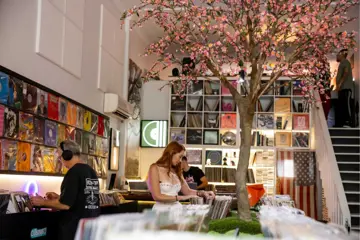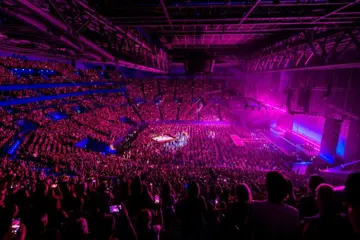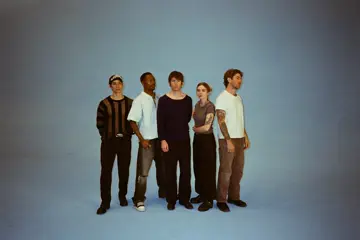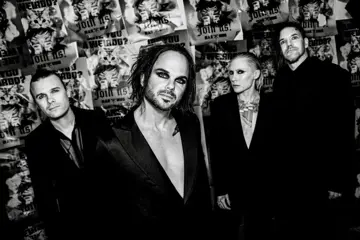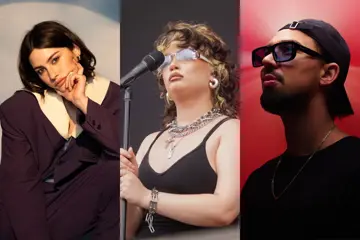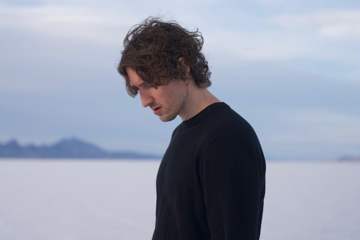"I've been back from the Europe tour for about three weeks now and we've just finished doing the album release tour around NZ,” Dylan Jones explains, drawing a deep breath to talk about the rest of the group's extensive plans. “That was killer – we wrapped that up last weekend and now we're off to Australia and then I'm off to Detroit after that which will be a mission, then back to Germany and Europe for the next few weeks after that so it's just been non-stop.”
While the album's release schedule is hectic, The Upbeats do have a way of dealing with the massive amount of commitments that they've taken on. Effectively being in two places at once, either half of The Upbeats (Jones or his colleague Jeremy Glenn) are able to perform shows as The Upbeats by themselves. Dylan assures that where possible they do the shows together (as we'll see them for their Australian shows) but this freedom offers them a lot more opportunities to take their music abroad, none of which it seems they pass up very often.
“We do sort of split up for some shows,” he confirms. “Some of them we can't quite make with the both of us. We love to play together most of the time but sometimes it doesn't work out for whatever reason and we have to flip a coin.”
The schedule is ramping up to promote the release of the group's latest album Primitive Technique, which sees The Upbeats get back to their roots in the beginnings of drum'n'bass music, a genre which has always been a massive part of, and really the most dominant force in, the electronic music scene of New Zealand.
Don't miss a beat with our FREE daily newsletter
“It has always been strong and it really still is very strong here,” he says of New Zealand's support for drum'n'bass. “There's a whole bunch of dance music bouncing around down here but [drum'n'bass] really has been the strongest I think and has kind of maintained that. Maybe it's because it's a little bit colder and the rawer landscape lends to that? We don't have the warm beaches or those kind of beach parties so it could be some kind of climate thing? It's weird,” he laughs. “It just keeps on pushing. It really helps that guys like Shapeshifter and Concord Dawn have really pushed it up in the early days and it really came through into the mainstream early on which played a large part in solidifying it as festival music and got a lot of people into it who otherwise might not have gone into a dingey club to see it.”
As well as the new album Primitive Technique, Dylan and Jeremy have been occupying what little free time they have with a number of other exciting projects. They've been producing a hip hop album for the rap artist Armanni Reign, who features heavily on a number of tracks on Primitive Technique. They've also spent quite a large amount of time getting behind the controls and co-producing a new album for the aforementioned Shapeshifter, an experience Dylan says has already provided inspiration for their other projects as well.
“It's just about to come out actually,” he says. “We co-produced it with them – we pretty much spent half of last year working on it with them in the studio, kind of building up their ideas and working alongside them. That was awesome and was such a cool experience for us because we've never done anything like that before production-wise. We were using a lot of live instruments and vocals and stuff that was maybe a little bit more traditional and things that were maybe a little bit out of our safety zone.”
The Upbeats were working on the new Shapeshifter album, Delta, at the same time as their own new record Primitive Technique, and Jones says that the experience already influenced the way they approached their own record and will continue to inform how they work in the future. One of the group's main goals for Primitive Technique was to craft noise that sounded more organic in nature, no easy task when all your building blocks for making music start at the computer.
“When we came up it was when people were all using outboard gear and it was all old crusty desks and things sounded a bit rougher and a bit crusty around the edges,” he says nostalgically. “We've always been such a big fan of that and really fell in love with that kind of sound. Everything since then has been coming from computers and a lot of it sounds quite digital and that comes through in a lot of production where it just sounds too sterilised and tight – so clean and plasticky. We really went to an effort to make it sound pretty raw hence the whole Primitive Technique thing.
“We wanted it to be sort of old school sounding while still being relevant to these days. We're not exactly sticking to the rulebooks when it comes to writing stuff. We do a lot of things that are kind of out there – a lot of distortion and ramming stuff through things that aren't supposed to work to try and get this analogue sound that we are really after. Jeremy's dad has an amazing record collection of soul and funk and R& B and stuff like that which we like to use alongside the synthesisers and things.”
The track Drum Stop which nests early on in the record is a great example of The Upbeats using traditional sounding equipment and ideas to create something completely out of the usual stratosphere of where they, or drum and bass itself, usually reside. Calling the track 'crunchy' is a gross understatement which really doesn't give you any idea of the brutality at the heart of the song.
“Yeah, that one was pretty crazy!” Jones laughs. “A lot of the times when we're in the studio we're just jamming away and something crazy like that will come out. That tune was really out of the blue. We decided to just make it super weird and intentionally tried to make it a little bit strange. Sometimes we do try and challenge people a little bit and that was one of those times.”
Jones agrees that this sense of defying the audience's preconceptions of what to expect from a record by The Upbeats, or by any drum'n'bass artist for that matter, is somewhat due to the mainstream uptake of dubstep and bass music in general.
“It's definitely something that's in the back of our heads,” he says. “It's cool that people are doing really well out of drum'n'bass and that it's crossing boundaries and stuff like that, but some of it is just a bit nasty and treats people like idiots.”

